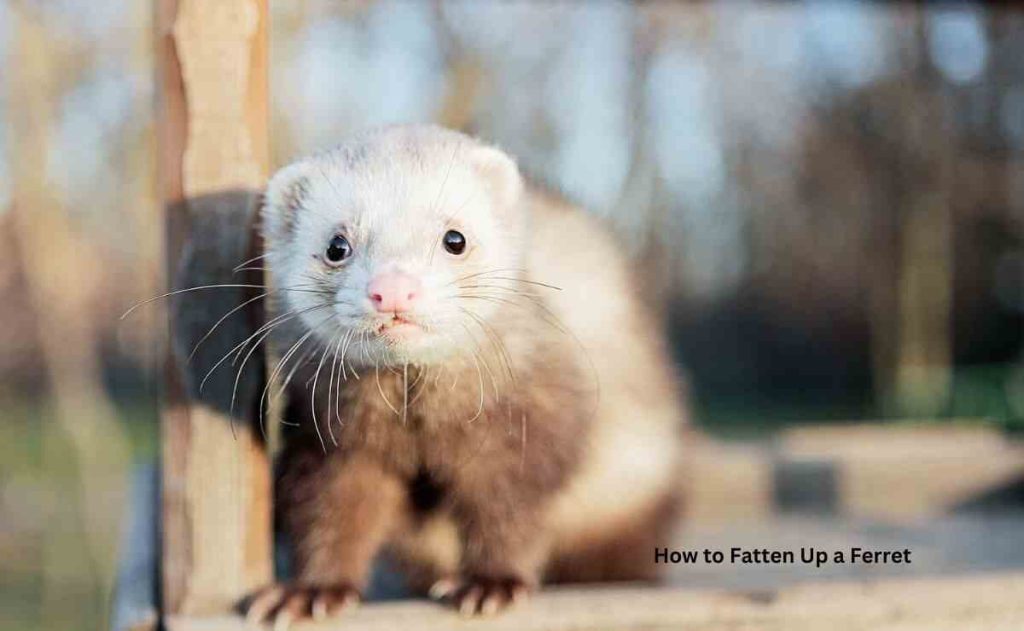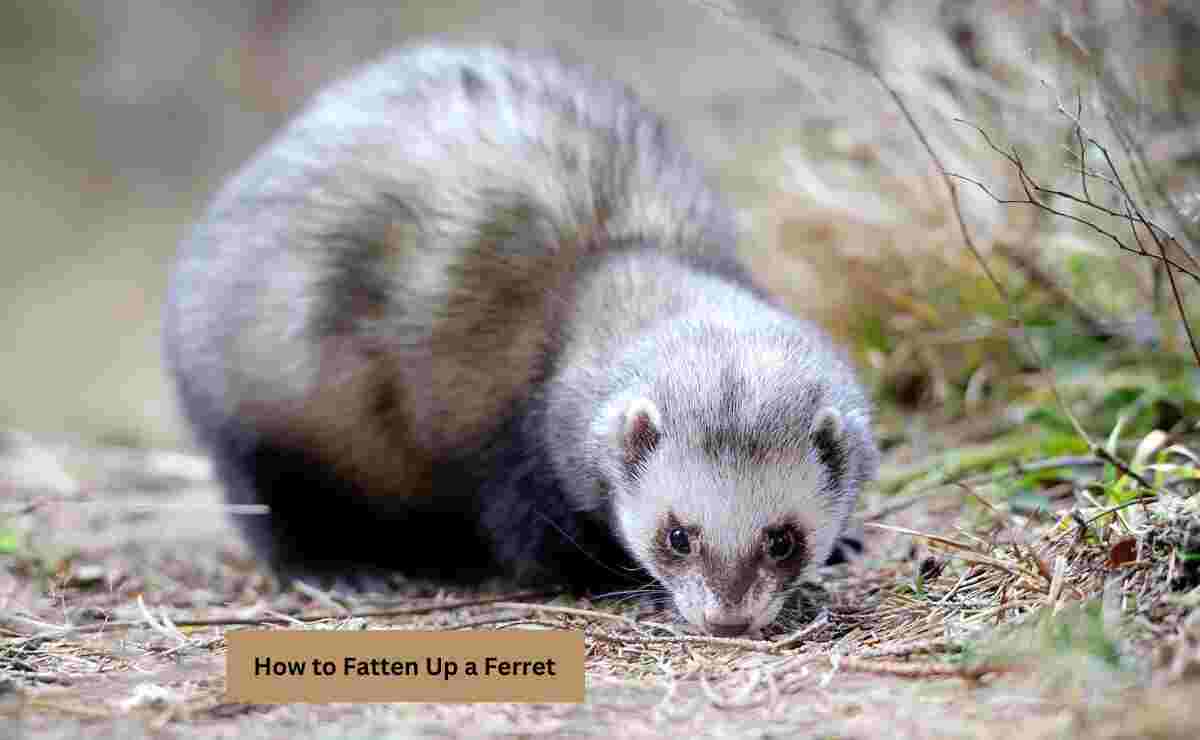Ferrets are adorable creatures that make great pets for those who are seeking a loyal and playful companion. However, as with any pet, it’s essential to ensure they receive the proper nutrition to maintain their health.
So, how to fatten up a ferret? If you have a ferret that is underweight or simply needs to gain some extra pounds, there are several things you can do to fatten them up in a healthy way.
In this post, we’ll discuss the various ways you can help your ferret put on weight safely. From choosing the right foods to providing plenty of exercise opportunities, we’ll cover all the necessary steps needed to help your furry friend reach their ideal weight.
How to Fatten Up a Ferret?

Fattening up a ferret can be done in a few simple steps.
- First, make sure your ferret is getting enough exercise and is not too active for its own good. Ferrets are naturally active animals, so providing them with plenty of toys and space to explore will help keep them healthy and fit. You can also provide your ferret with an outdoor enclosure or playpen to give them the opportunity to explore and get some exercise.
- Second, make sure you are feeding your ferret a high-quality diet that is rich in proteins, fats, and carbohydrates. Look for foods that contain at least 30% protein, 15-20% fat, and 20-30% carbohydrates. Avoid sugary treats or processed foods as these can lead to obesity.
- Finally, if you want to fatten up your ferret quickly, consider adding extra fats to its diet in the form of oils or nut butter.
Why Does A Ferret Become Skinny?
A ferret can become skinny for a variety of reasons. One of the most common is inadequate nutrition. Ferrets require a high-protein diet and should be fed a commercial ferret food that meets their nutritional needs. If they are not getting enough protein, or if they are eating foods that do not contain enough nutrients, they may become skinny.
Another possible cause of weight loss in ferrets is gastrointestinal issues such as parasites or an underlying medical condition like cancer. If your ferret has lost weight suddenly or appears to be losing weight over time, it’s important to take them to the vet for a checkup. The vet can diagnose any underlying medical issues and provide appropriate treatment.
Finally, stress and depression can also cause weight loss in ferrets. If your ferret is in a new environment or around unfamiliar people, it may become stressed which can lead to decreased appetite and ultimately weight loss.
Which Foods Are High Foods for Ferrets?
Ferrets are obligate carnivores, meaning their diet should be primarily composed of animal proteins. High-protein foods that are good for ferrets include raw or cooked meats such as chicken, beef, lamb, and fish.
Eggs and dairy products like yogurt can also be included in a ferret’s diet. In addition to these sources of animal protein, other high-protein foods for ferrets include certain types of insects, such as mealworms and crickets.
Ferrets also need some fat in their diet to help them stay healthy and energetic. Good sources of fat for ferrets include fatty fish like salmon and sardines, as well as eggs and certain types of nuts. It is important to note that while these fats are beneficial to ferrets, they should not make up more than 10% of the total dietary intake.
Remember, it is important to provide your ferret with a balanced diet by including some fruits and vegetables in his or her meals.
How Can You Understand Your Ferrets Are Underweight?
Understanding, if your ferret is underweight, can be done by looking at the ferret’s body condition. A healthy ferret should have a visible waist and their ribs should be easily felt, but not seen. If the ribs are visible or the waist is not, then your ferret may be underweight. You can also compare your ferret to an ideal weight chart to get an idea of how much it should weigh.
To assess body condition, you can also look at the overall health of your ferret. If they are lethargic or have a dull coat, this could be an indication that they are not getting enough nutrition and may be underweight. Additionally, if you notice any changes in appetite or behavior, it could mean that something is wrong and they need to see a veterinarian for a checkup.
What is The Perfect Weight for Ferrets?
The perfect weight for ferrets can vary depending on their age and activity level. Generally, a healthy adult ferret should weigh between 1.5 – 4 lbs. Young ferrets may weigh less than 1.5 lbs, but should steadily increase in weight as they grow older.
If you are concerned about your ferret’s weight, it is important to consult with your veterinarian to ensure that it is within the ideal range for its age and activity level. A vet can also help identify any underlying health issues that could be causing a ferret to gain or lose weight abnormally.
In addition to consulting with a vet, there are several things that owners can do to maintain their ferret’s ideal weight, including providing them with a nutritionally balanced diet and plenty of exercise opportunities. Regularly weighing your pet can also help you monitor its progress and make adjustments as needed.
How to Maintain A Good Diet for Ferrets?
Maintaining a good diet for ferrets is essential to their overall health and well-being. Ferrets are obligate carnivores, meaning they require a high-protein diet of animal-based proteins to meet their nutritional needs. They should be given a diet that consists of high-quality ferret food or raw meat, such as chicken, beef, or fish. It’s important to ensure that the food is appropriate for ferrets and does not contain any grains or fillers.
For providing a balanced diet, it’s also important to make sure your ferret has access to fresh water at all times. You can provide them with either a water bottle or bowl filled with clean drinking water.
Moreover, you should offer your ferret treats and supplements on occasion to give them variety in their diets and help keep them healthy. Make sure these treats are specifically designed for ferrets and do not contain any artificial additives or preservatives.
Conclusion
Fattening up a ferret requires patience, commitment, and a well-balanced diet. It is important to seek the advice of a veterinarian before making any significant changes to your ferret’s diet or lifestyle.
Consider introducing high-calorie treats in moderation and gradually increasing their sizes proportionally over time. Remember that obesity can lead to serious health consequences for your pet, so it is crucial to monitor their weight and adjust their diet accordingly. With proper care and attention, you can ensure that your furry friend is happy, healthy, and well-nourished.
